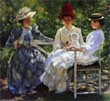 Over the years at Blather, we have described many of the items we have covered as ‘weird news’. Certainly we mean ‘weird’ in both its strict sense (uncanny, supernatural: like schools closing because of ghosts) and in its colloquial sense (strange, incomprehensible: like a corpse propped in front of a TV for two years without anyone noticing). But did you know that ‘weird’ originally meant something entirely different?
Over the years at Blather, we have described many of the items we have covered as ‘weird news’. Certainly we mean ‘weird’ in both its strict sense (uncanny, supernatural: like schools closing because of ghosts) and in its colloquial sense (strange, incomprehensible: like a corpse propped in front of a TV for two years without anyone noticing). But did you know that ‘weird’ originally meant something entirely different?
The original word was a noun, whereas we use the word as an adjective (e.g. ‘Barry is weird’) or an adverb (e.g. ‘Barry is acting weird’)…
AND it was originally spelt wyrd…
To understand the concept of wyrd we need to look at history. Britain in the late Roman Empire was Christian, but from around 449 AD pagan Germanic tribes (Angles, Saxons and Jutes) invaded and settled. They brought pagan beliefs, as described in Old English literature and Tacitus’ Germania. The Germanic tribes lived in a warrior-band based society. Life was seen as a hard struggle ending with a warrior’s destiny (i.e. death). This fate was probably utterly meaningless, there being no conclusive evidence that the Anglo-Saxons believed in an after-life (like the warriors’ Valhalla of Scandinavian mythology). The word for Fate was Wyrd, and that originally meant simply ‘what happens’. So if somebody in those days had said ‘that’s wyrd’ they would have meant ‘that’s just the course of events.’
But reading Old English texts like Beowulf will not give you direct access to pagan beliefs. Christian missionaries spread Christianity through Britain, culminating in the Synod of Whitby in 664, and ‘wyrd’ came to acquire a Christian meaning. Even the pagan Danish invasions from 793 onwards did not halt the tide of Christianity; instead it ultimately resulted in English missionaries converting Scandinavia. Many pagan concepts continued in Christian form, and ‘wyrd’ came to mean destiny or fate as determined by almighty God.
Our ‘weird’, the adjective, first appeared in late Middle English, originally only preceding ‘Sisters’ in ‘Weird Sisters’. The Weird Sisters are the Fates, the Nornir of Norse mythology. Their names are Urd, Verdandi and Skuld, the goddesses of the past, the present and the future, respectively. They dwell beneath the roots of Yggdrasil, the World Tree, and weave and spin everyone’s fate, even the fates of the gods themselves. (As an interesting side-note, Old Norse and Old English have common roots as Germanic languages, and ‘urd’ is believed to come from the same root as ‘wyrd’).
The Weird Sisters appear in Shakespeare’s Macbeth (first performed 1605 or 1606) and this accounts for the strong endurance of the word in Modern English. Examples in the Oxford English Dictionary of the meanings of weird between 1815-1820 include: ‘of strange or unusual appearance, odd-looking’; ‘partaking of or suggestive of the supernatural; of a mysterious or unearthly character’; and ‘out of the ordinary course, strange, unusual; hence odd, fantastic.’
‘Weird’ as a noun survived beyond Old English. In 1470 it meant ‘that which is destined or fated to happen; predetermined events collectively’, but by 1814 it no longer meant fate, but ‘a supernatural or marvellous occurrence.’ It is now archaic, although I note that in Stephen Donaldson’s Chronicles of Thomas Covenant, fantastic creatures called Waynhim have a concept of ‘Weird’, which means ‘doom, destiny or duty.’ We at Blather would be interested to know of any other uses of ‘weird’ in modern parlance that hark back to the old meanings of ‘wyrd’.
Until then remember, when facing the zeitgeist or the shitegeist, ‘weird’ is just stuff that happens.

wonderful!
You’ve been hanging out with those Oslo Odinists for too long Barry…
Fascinating stuff. Etymology-tastic!
In the film the wicker man, on the school blackboard there is a note. Something like, the hagstone protects the newborn from the weird!
And also a reference to the “Wyrd Sisters” in a ‘Harry Potter’ tale!